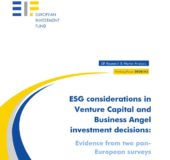
Bron
EIF
The European Investment Fund (EIF) published a working paper ‘ESG considerations in Venture Capital and Business Angel investment decisions: Evidence from two panEuropean surveys’. This working paper provides testimony on the integration of ESG considerations and impact investing in the areas of venture capital (VC) and business angel (BA) investing. ESG investing appears to be accelerating into the investment mainstream, as approximately 7 in 10 VCs and 6 in 10 BAs incorporate ESG criteria into their investment decision process.
The results are survey-based and are derived from the respective questions in the EIF VC Survey 2019 and the EIF Business Angels (BA) Survey 2019. The paper discusses the combined findings from both surveys in relation to the respondents’ ESG considerations, and clusters the ESG-related results around six main themes:
- What is the level of ESG engagement in VC and BA investing?
- What motivates VCs’ and BAs’ ESG engagement (and what deters them from doing so)?
- What are the most common ESG investment strategies?
- How do VC firms implement ESG criteria in terms of policies and procedures?
- How do VCs and BAs perceive the relation between ESG considerations and investment returns?
- What lies ahead for ESG investing?
Some of the results are:
- ESG investing appears to be accelerating into the investment mainstream, as approximately 7 in 10 VCs and 6 in 10 BAs incorporate ESG criteria into their investment decision process.
- Ethical or social responsibility considerations are the most widely cited motive for ESG engagement.
- The desire to encourage change towards responsible business practices at investee companies as well as ESG integration as part of the formal investment policy complete the top three of ESG drivers.
- Ethical or strategic motives are in general more important than the financial materiality of ESG criteria (as reflected in the relevance of ESG criteria for investment performance or for risk mitigation).
- However, the financial relevance of ESG criteria is a stronger motive for ESG engagement in the case of VC investors relatively to BAs, who are more highly motivated by the will to have a positive footprint in society.
- For VC fund managers, external factors such as the positive reputational signal associated with ESG investing and the growing pressure from Limited Partners are also powerful determinants of ESG adoption.
- For both VCs and BAs who do consider ESG criteria, the use of ESG information predominantly serves as a portfolio screening tool.
- VCs apply ESG screening particularly on an exclusionary basis at due diligence (‘negative screening’), whereas the vast majority of BAs explicitly target firms that perform well in terms of selected ESG criteria (‘positive screening’).
- Negative screening appears to be mainly driven by the mitigation of ESG-related risks or as a response to growing demand from LPs for ESG consideration, as it is considered a relatively easier way for the GPs to become ESG-compliant.
- By contrast, positive screening is seen more like an opportunity for value creation, as it is prominently pursued among VC fund managers who consider ESG criteria due to their relevance for investment performance or as part of their firm’s investment policy.
- ESG strategies that generally entail either a greater involvement on the part of the General Partners (e.g., ‘active ownership’ in the form of direct engagement with and provision of ESG expertise to investee companies in order to improve their ESG performance) or a more formalised approach to ESG incorporation (e.g., an ESG ‘factor’ integrated into valuation) are much less frequently adopted.
- In the case of BAs, ‘impact investing’ (i.e. seeking to generate a positive social and/or environmental impact alongside a financial return) ranks second among all ESG investment strategies



